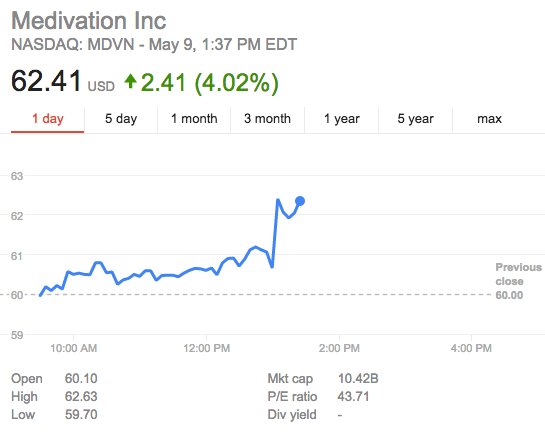Medivation is reportedly giving into the pressure to find a buyer.
Reuters reports that Medivation has decided to explore a sale after pharma giant Sanofi went public with a $9.3 billion bid for the company last month. Medivation had rejected that bid but it wasn’t long before it was fielding other offers and analysts were speculating about possible buyers.
Medivation declined to comment on the report.
The San Francisco-based biotech already has one drug on the market to treat prostate cancer with more in development, which makes it a target for a big drugmaker looking to beef up its product pipeline. So far, Pfizer and Amgen have signed non-disclosure agreements with Medivation so they can receive confidential information, Reuters reported, citing people familiar with the matter.
Medivation’s stock was up 4% on the news Monday afternoon.
 Google Finance
Google Finance
Here’s what makes the company’s pipeline so appealing:
- Medivation’s one drug on market already is called Xtandi, or enzalutamide, which the company developed with Japan’s Astellas. It’s an oral drug that used to treat is used to treat late-stage prostate cancer. It was originally approved by the US Food and Drug Administration in 2012 based on a study that evaluated its ability to increase how long patients survived (median overall survival was 18.4 months for those who took Xtandi in the trial, compared to 13.6 months median overall survival for those who took a placebo). It does cost a list price of $129,000 in the US, which has gotten it in some hot water with Congress.
- Medivation is also researching how enzalutamide works in people with other types of prostate, breast and liver cancers.
- Medivation also has two other cancer drugs in late stage trials, including talazoparib, which it acquired last August. The drug is being studied in certain types of breast cancer, as well as other kinds of cancers including cervical, lung, and ovarian.
- Another drug to treat a certain kind of blood, pidilizumab, is also in a late-stage trial.
- The big thing with these drugs is that they’re being explore in combination with immunotherapies, or treatments that use the immune system to fight off cancer cells. Response rates — instances in which the cancer stops spreading or shrinks in response to immunotherapy drugs — on their own are still fairly low, but researchers hope that cancer immunotherapies combined with other treatments (say, Medivation’s oral drugs), could push that response rate way up.
- And immunotherapies are a huge business, with multipleinvestors setting up funds for companies developing immunotherapies.
NEXT:Here’s why major drugmakers are going after a relatively unknown biotech
RELATED:Shares of a small drugmaker tanked after it became the target of Congress’ fight against high drug prices
NOW WATCH: Here’s what scientists think aliens could actually look like













